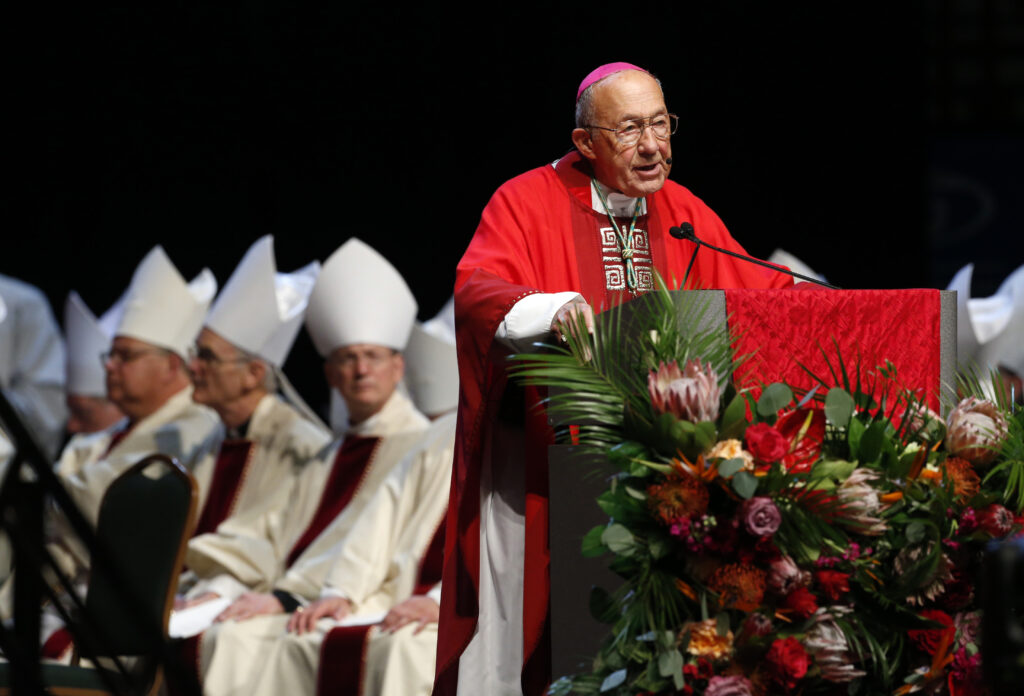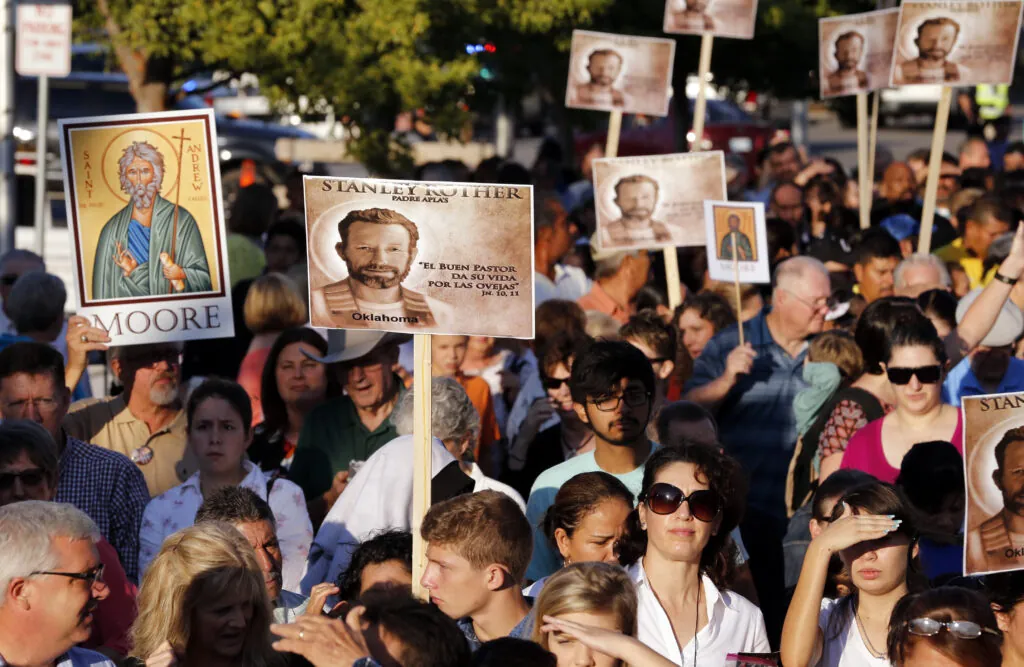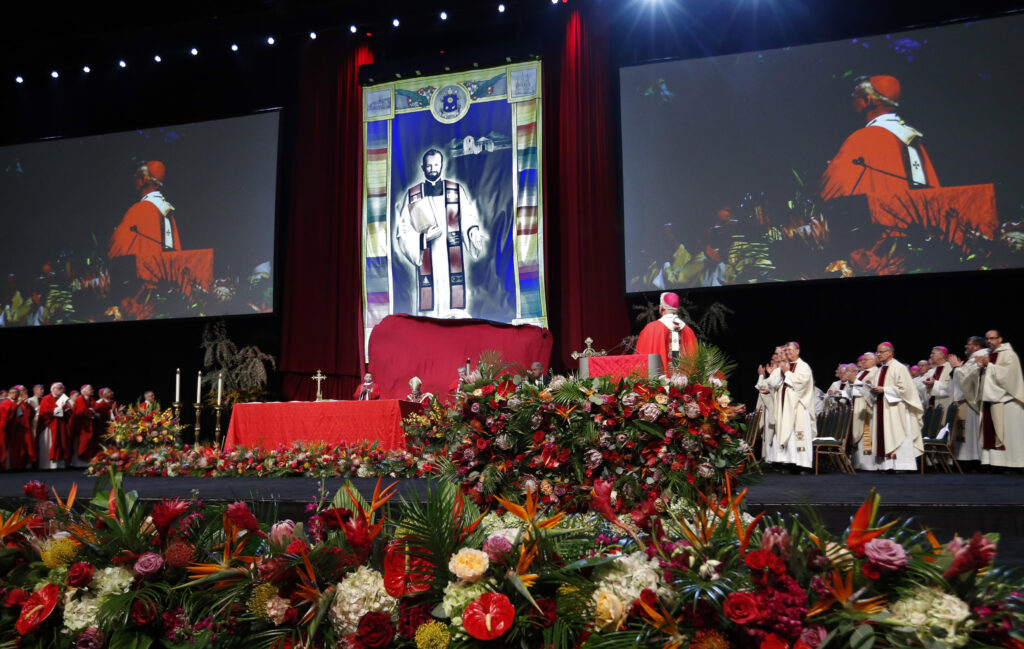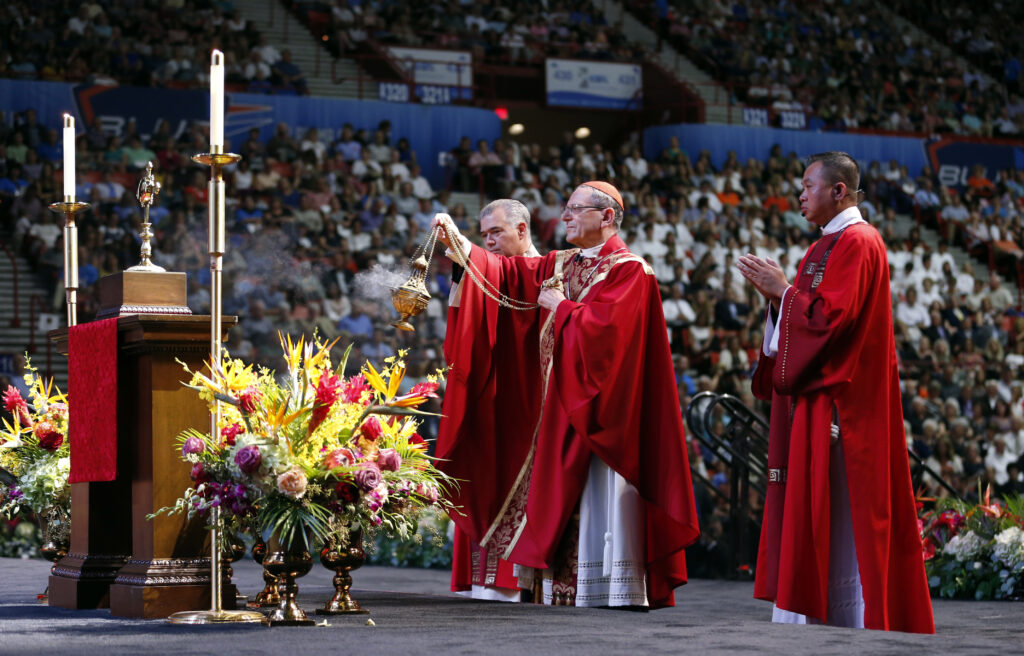Imagine believing in something so strongly, you sacrifice everything — including your own life — to defend it. For this Catholic Order of Foresters member, there was no imagining.
As we told you in the spring 2018 edition of Catholic Forester Magazine, Fr. Stanley Rother of Sacred Heart 1813, Okarche, Oklahoma, served as a priest in Guatemala in the 1980s. There, he ministered in some extreme and powerful ways including building schools and hospitals, translating the New Testament to the Mayan language spoken by the locals, and teaching the locals — most of whom lived in poverty — how to plow fields and rotate crops.
His ultimate sacrifice earned him the title of martyr, and on September 23, 2017, he was beatified — the first U.S. priest to be so. As construction begins on the shrine in Oklahoma City, Okla., to honor him, we caught up with a few priests who experienced the beatification and one archbishop who attended the same seminary as Fr. Stanley Rother.

“I don’t know if any of us expected it to be as big as it was,” Fr. Will Banowsky, who is currently studying in Rome, said of the beatification. It took place in Oklahoma City at the Chesapeake Energy Arena and had, as Fr. Will describes it, the energy of an NBA Championship event. (And this city is familiar with that specific level of excitement. The NBA team in town, the Oklahoma City Thunder, competed in the Conference Finals the year before Fr. Stanley’s beatification and played in the NBA Finals four years prior to that.) Local bars and restaurants opened on Saturday for the lunch crowd and found their establishments filled with what — to them — seemed like a different crowd. “They’re telling the bartenders, ‘We need you to put on EWTN!’ which I don’t think has ever been on in a bar before,” Fr. Will said. People traveled from all over to attend the beatification, watch in town on a television, or participate in the day. “A lot of the local Guatemalans led a procession from the churches,” Fr. Will said, adding, it was a “miracle” he and Fr. Jerome Krug — who carpooled — even found a parking spot.

“It was easily the most beautiful Mass I’ve ever been to,” Fr. Jerome, parochial vicar at St. Peter the Apostle, said. A documentary detailing the story of Fr. Stanley Rother’s life and sacrifice — An Ordinary Martyr — played before the beatification began. “You looked around at the end of that video and there was not a dry eye in the place,” he said. One of the most beautiful things about the beatification, Fr. Jerome explains, is how everyone who had a story about Fr. Rother shared it during this time. Fr. Jerome also found beauty in how real it all was. Fr. Stanley’s brother and sister (who are elderly but still living) carried relics of their brother to the altar. “It was just so real and tangible and close,” Fr. Jerome said. “My one takeaway from the beatification was the immensity of what God’s grace can do and wants to do in each person,” he said. “That is not something that is far away from us, but is as close to use as Okarche, Oklahoma, is to Oklahoma City (which is very close).”

Fr. Rother Today
Fr. Rother’s influence reaches beyond the confines of a particular time and place, offering an inspiration to contemporary Christians. In 1980, Fr. Rother wrote, “Shepherds don’t abandon their flock at the first sign of danger.” He had an opportunity to come back to the United States when his life was in danger in Guatemala, but he chose to stay. “Priests were ordained to serve not to be served,” Banowsky said, “so you aren’t going to run at the first sign of danger or inconvenience or discomfort, you’re going to stay and be available and be reliable and be consistent,” Krug said, “is something that the church and priests can learn from Blessed Stanley.” And at a time when Pope Francis calls Christians to love the poor, Fr. Rother’s life offers a framework for missionary work.
Archbishop Coakley, who spoke with Pope Francis about Fr. Rother in January, said “I think he embodied much of what Pope Francis had been speaking about.” “Pope Francis is always talking about the idea of … closeness to the poor,” Krug said. When Fr. Rother was in Guatemala he would be invited, “to the poorest parts of the village for dinner with parishioners, and instead of avoiding those, he’d go and answer those invitations even though the hygiene level and the food preparation and quality was generally so poor that he’d get food poisoning almost every time he’d go to the poorest parts of the village for a meal that a family invited him over to their dirt floored hut, yet he continued to go knowing that would be a price he would pay,” Krug said. Fr. Rother shows us, Krug said “if there’s not a lived closeness, a friendship between those who are living in poverty and those who have wealth, then there’s not the idea of it taking place but rather just some sort of social service.”
Even as Rother helped those in need, he worked to overcome struggles of his own. “Ultimately, this seminarian that was forced out of seminary later overcame that deficit and not only became proficient in Spanish but mastered a difficult and arcane Mayan dialect…It was the work of the Holy Spirit that helped him overcome his human limitations,” Archbishop Coakley said. His life gives “a very humanizing idea of what holiness is,” Krug said. Holiness is not something out of reach for Christians, rather it is close, “that’s what I’d want people to realize…that they can be a great saint.”
Shrine to Blessed Stanley Rother
On November 3, 2019, the Archdiocese of Oklahoma City broke ground on a shrine to Fr. Rother. The shrine, whose construction began amid the pandemic, is expected to be completed on July 28, 2022, the feast of Fr. Rother. The property will house a Spanish colonial church in traditional cruciform style. Pilgrims will also be about to visit an event center, devotional spaces, and a classroom building on the former nine-hole golf course. Archbishop Coakley said the shrine “will be a place of pilgrimage for all who come to venerate the tomb.”
Click here for more information and updates about the shrine!
Article by Katlyn Pischel and Nick Sentovich
